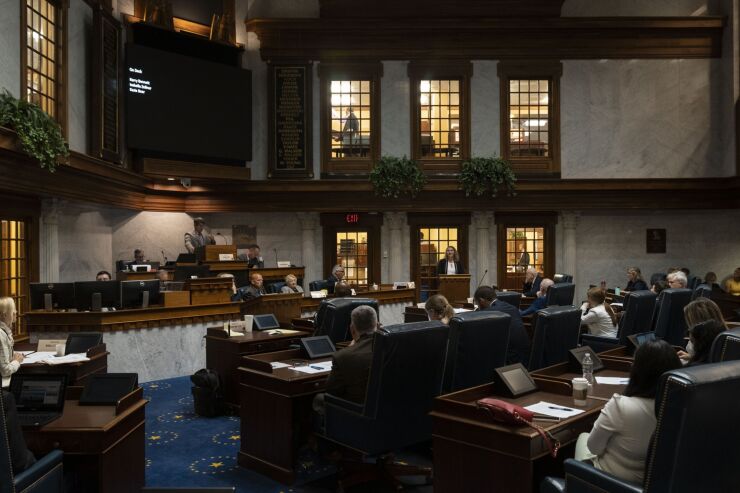Indiana saw a tax revenue windfall in January, with general fund revenues coming in 15.8% above last January's number and 9.3% above December's projections.
But the office of Chief Economist Hari Razafindramanana cautioned that individual income tax collections surpassed estimates only because of "unusual timing factors that are currently expected to normalize… over the coming months."
Income tax collections netted $1.028 billion in January, 16.6% above the previous month's estimate and 36.4% above January 2023's totals, according to the State Budget Agency's

"More than $200 million of the monthly collections is attributable to unusual payment timing as taxpayers adjust to recent tax law changes," the chief economist's office noted. "This combines with potentially more than $200 million of payments received in December also attributable to unusual payment timing. Over the coming months, monthly collections are expected to fluctuate significantly."
Razafindramanana told The Bond Buyer that "it's a little bit tricky" because the $400 million dollars Indiana is seeing right now "is a mixture of payment coming in in the first place, and then returns coming in later -- so refunds may be seen later on."
He added: "If you look at our report and look at the year-over-year growth rate, that does show some level of growth. You see continued growth; obviously, it's being inflated by this timing thing. But when you look at where we are, I think it's safe to say that we are around the forecast, which was anticipating healthy growth for income taxes. So it's not a negative story, but it's not $400 million."
Corporate tax collections brought in $46.7 million in January, which was 294.1% above December's estimate and 139.9% above January 2023's total. Razafindramanana's office attributed the jump to factors including payment and refund timing, late payments and the repeal of the utility receipts tax and utility services use tax.
Razafindramanana said Indiana saw some late corporate tax revenue posting from December, and sought to temper expectations. The corporate tax revenue story, he said, is "the same dynamic that's going on with individual income tax… When you look at month-to-month, there was just a late payment that was posted in the last month. So it's similar to the income tax situation.
"The most important months in terms of revenue activity are ahead of us," he said. "So you don't want to overinterpret that."
Sales tax collections and riverboat gambling tax collections were both down year-over-year, falling 1.4% and 4.8%, respectively, below January 2023's totals.
With April and June being the two highest revenue activity months of the year, budget officials urged patience and said year-over-year comparisons will be more revealing then. Razafindramanana's office did not respond to requests for comment.
Not everyone wants to wait to put the surplus to use. State Rep. Greg Porter, D-Indianapolis, has suggested the state deploy the extra tax revenue to address an unexpected shortfall in the state's Medicaid funding.
"Our revenue sources are moving north, so that we may wind up with about half a billion dollars in surplus for this year," Porter told The Bond Buyer. "We look at it over the life of the two-year budget. We still have about 16 months of revenues that may come to us... I wanted to use those dollars to take care of the Medicaid shortfall."
In December, state legislators found out that Indiana's Medicaid program would be underfunded by $1 billion due to a forecasting error.
"This underfunding of such a critical program is an unfortunate surprise that was hidden from the General Assembly until the last minute, and now leaves the Medicaid program to scramble to figure out which programs they are going to have to cut," Porter
Porter's Democrats are in the minority in the Indiana State House, where the GOP runs the show, and Republican Eric Holcomb is the governor.
"House Democrats feel that we need to take care of the least of these," Porter said. "We continue to give corporate tax breaks... but we have almost 2,000 people whose lives are hanging in the balance in regards to not having care. The state of Indiana made a contract with these parents."
The state Family and Social Services Administration has attributed the unexpected expenses driving the shortfall to the attendant care program, which pays family caregivers of the elderly or disabled children roughly $15 an hour. The disabled children's portion of the program
The FSSA wants to transition the families using the attendant care program to a different program that pays caregivers a daily stipend instead of an hourly wage, which, along with other changes, could save the state Medicaid program millions.
"I believe that with the dollars that we have, we can do attendant care – which is not a lot of money, it's a miniscule amount – and we can do it all," Porter said. "I met with these families, I met these children over the last few weeks, and they're real people. They're not just a number. When people don't see them or deal with them, they become very cavalier with regards to the people that this affects."
Porter noted that parents in the attendant care program are trying to keep children with complex disabilities out of institutions, which can cost families $300 to $400 a day. Some of those parents have said they could not afford to care for their children full-time without the hourly wage from the attendant care program.
"Out of a $12 billion budget, this is only $100 million," Porter said of that program. "It's not a lot of money."
Indiana's modified version of the Affordable Care Act's expanded Medicaid program is nine years old.
Indiana's Republican leaders under then-Gov. Mike Pence enacted the Healthy Indiana Plan, which adds
The Trump administration





